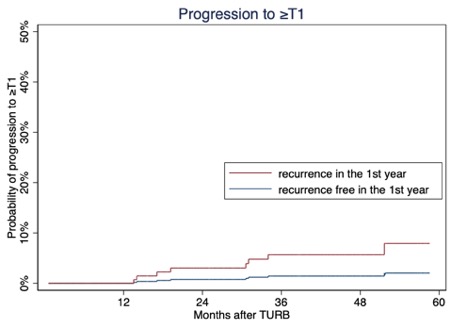Back
Poster, Podium & Video Sessions
Podium
PD26: Bladder Cancer: Non-invasive I
PD26-09: Primary Ta High Grade Bladder Tumors: Determination of the Risk of Progression
Saturday, May 14, 2022
2:20 PM – 2:30 PM
Location: Room 252
Fahad Quhal*, Keiichiro Mori, Ekaterina Laukhtina, Benjamin Pradere, Vienna, Austria, Francesco Soria, Turin, Italy, Marco Moschini, Luzern, Switzerland, Alberto Briganti, Milan, Italy, Pierre I. Karakiewicz, Montreal, Canada, Shahrokh F. Shariat, Vienna, Austria

Fahad Quhal, MD
Medical University of Vienna
Podium Presenter(s)
Introduction: TaG3 bladder cancer is an under-investigated disease and because of its rarity it is commonly studies together with T1G3 disease. We sought to exclusively study TaG3 disease and to determine the factors associated with disease progression.
Methods: Of 3505 patients with NMIBC, 285 patients had primary TaG3 and with no concomitant carcinoma in-situ. The median follow-up was 43 months; 70% of the patients received adjuvant BCG.
Results: Progression to =pT1 occurred in 21 patients (7.4%). In a multivariable competing-risk regression analysis, intravesical BCG was significantly associated with a lower risk of progression to =pT1 (HR 0.23, 95%CI 0.08-0.64, p=0.005). Recurrence in the first year of diagnosis was significantly associated with an increased risk of stage progression to =pT1 (HR 7.81, 95%CI 2.50-24.44, p<0.001). Progression to =T2 was observed in 9 patients (3.2%). In univariable competing-risk regression analyses, intravesical BCG was significantly associated with a lower risk of progression to =pT2 (HR 0.11, 95%CI 0.04-0.47, p=0.003). On the other hand, recurrence in the first year of diagnosis was significantly associated with an increased risk of stage progression to =T2 (HR 7.12, 95%CI 1.50-33.77, p=0.013). In a subgroup of 199 patients who were treated with BCG, there was no statistically significant association between tumor recurrence in the 1st year of diagnosis and stage progression to =pT1 (p=0.14) or =pT2(p=0.19).
Conclusions: Patients with TaG3 bladder cancer are considered high risk but if appropriately treated with BCG that risk is considerably mitigated. Our data support that TaG3 without concomitant CIS should not be considered as aggressive as T1G3 as it has a lower risk of progression to muscle-invasive bladder cancer (MIBC). Recurrence in the first year after diagnosis is the strongest predictor of progression to MIBC.
Source of Funding: No funding

Methods: Of 3505 patients with NMIBC, 285 patients had primary TaG3 and with no concomitant carcinoma in-situ. The median follow-up was 43 months; 70% of the patients received adjuvant BCG.
Results: Progression to =pT1 occurred in 21 patients (7.4%). In a multivariable competing-risk regression analysis, intravesical BCG was significantly associated with a lower risk of progression to =pT1 (HR 0.23, 95%CI 0.08-0.64, p=0.005). Recurrence in the first year of diagnosis was significantly associated with an increased risk of stage progression to =pT1 (HR 7.81, 95%CI 2.50-24.44, p<0.001). Progression to =T2 was observed in 9 patients (3.2%). In univariable competing-risk regression analyses, intravesical BCG was significantly associated with a lower risk of progression to =pT2 (HR 0.11, 95%CI 0.04-0.47, p=0.003). On the other hand, recurrence in the first year of diagnosis was significantly associated with an increased risk of stage progression to =T2 (HR 7.12, 95%CI 1.50-33.77, p=0.013). In a subgroup of 199 patients who were treated with BCG, there was no statistically significant association between tumor recurrence in the 1st year of diagnosis and stage progression to =pT1 (p=0.14) or =pT2(p=0.19).
Conclusions: Patients with TaG3 bladder cancer are considered high risk but if appropriately treated with BCG that risk is considerably mitigated. Our data support that TaG3 without concomitant CIS should not be considered as aggressive as T1G3 as it has a lower risk of progression to muscle-invasive bladder cancer (MIBC). Recurrence in the first year after diagnosis is the strongest predictor of progression to MIBC.
Source of Funding: No funding


.jpg)
.jpg)